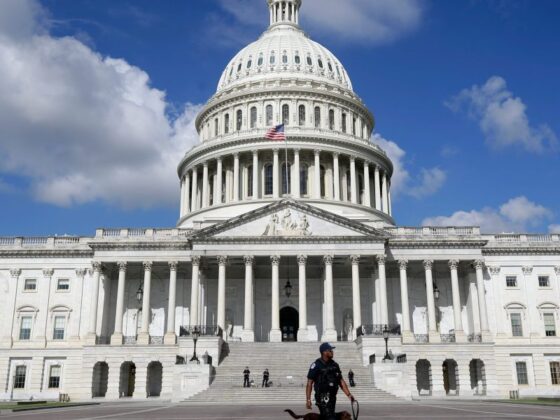Lawmakers have known for decades that U.S. entitlement programs are on unsustainable paths as demographics inevitably skew the population older.
Attempts to come up with a fix have gone nowhere, but the expected insolvency of the Social Security and Medicare trust funds by 2034 will serve as a catalyst, with the bond market forcing Congress to bite the bullet, according to Bernard Yaros, lead U.S. economist at Oxford Economics.
“These corrective actions will be painful for many households but are necessary to head off the risk of a fiscal crisis, whereby an abrupt, large decline in Treasury demand relative to supply sparks a sharp, sustained increase in interest rates,” he wrote in a note earlier this month.
Despite lawmakers’ longstanding reluctance to grab the “third rail” of politics and tackle entitlements, he said fiscal responsibility has actually been the rule, not the exception, in U.S. history.
Yaros also noted that President Donald Trump’s policies during his second term signal a “tightening bias” overall, though that assumes his aggressive tariffs as well as cuts to Medicaid and food assistance stay in place.
The future of Trump’s trade policy suffered a major blow on Friday, when a federal appeals court struck down most of his reciprocal tariffs. For now, however, they will stay in place until mid-October to give the Supreme Court a chance to rule.
Social Security and Medicare trust funds
The insolvency of the trust funds next decade will be the key driver for reforms, just as it was in the early 1980s when lawmakers hiked taxes to shore them up, Yaros said.
“For lawmakers to feel the urgency to take corrective fiscal action, voters need to connect the dots between
the unsustainability of the federal budget and their own financial wellbeing,” he explained.
But the tightening that he predicts in the 2030s will mostly take the form of cuts to non-discretionary programs, like Social Security, because discretionary spending is a smaller share of total government outlays, he noted.
Without some reductions, the trust funds will run out of money and retirees would face even more draconian cuts, including a sudden 19% drop across the board for Social Security, as payroll tax revenue becomes the sole funding source for entitlements.
“Therefore, a return to fiscal responsibility in the forecast will be more painful than in prior episodes as it will fall heaviest on federal transfer payments to individuals, which have historically been spared from past belt-tightening,” Yaros said.
By mid-century, he expects the cuts will lower fiscal transfers as a share of GDP back to 11%, rather than surge to more than 15% without cuts.
But that doesn’t mean reform will come easily. To avoid causing voters financial pain, lawmakers may try to take the more politically expedient path by allowing Social Security and Medicare to tap general revenue that funds other parts of the federal government.
“However, unfavorable fiscal news of this sort could trigger a negative reaction in the US bond market, which would view this as a capitulation on one of the last major political openings for reforms,” Yaros wrote. “A sharp upward repricing of the term premium for longer-dated bonds could force Congress back into a reform mindset.”
Bond vigilantes
The ability of bond investors to force lawmakers to change course has earned them the “bond vigilantes” moniker, which was coined by Wall Street veteran Ed Yardeni in the 1980s.
The perceived power of bond vigilantes was famously illustrated in the early 1990s, when U.S. yields jumped as investors dumped Treasuries amid fears about federal deficits in what became known as the Great Bond Massacre.
James Carville, who was an adviser to President Bill Clinton at the time, mused that he would like to be reincarnated as the bond market: “You can intimidate everyone.”
More recently, Trump also noted upheaval in the bond market as he put his most aggressive “Liberation Day” tariffs on hold in April following an epic selloff. That prompted economist Nouriel Roubini to say, “the most powerful people in the world are the bond vigilantes.”
But analysts at Piper Sandler recently dismissed the power that bond vigilantes actually have over politicians.
In a note Tuesday about Trump’s unprecedented step to fire Fed Governor Lisa Cook, they pointed out that the bond market didn’t prevent federal deficits from exploding and haven’t steered Trump away from pressing his tariff agenda.
“We find little evidence the market is forward looking or disciplines policy makers,” Piper Sandler said.













